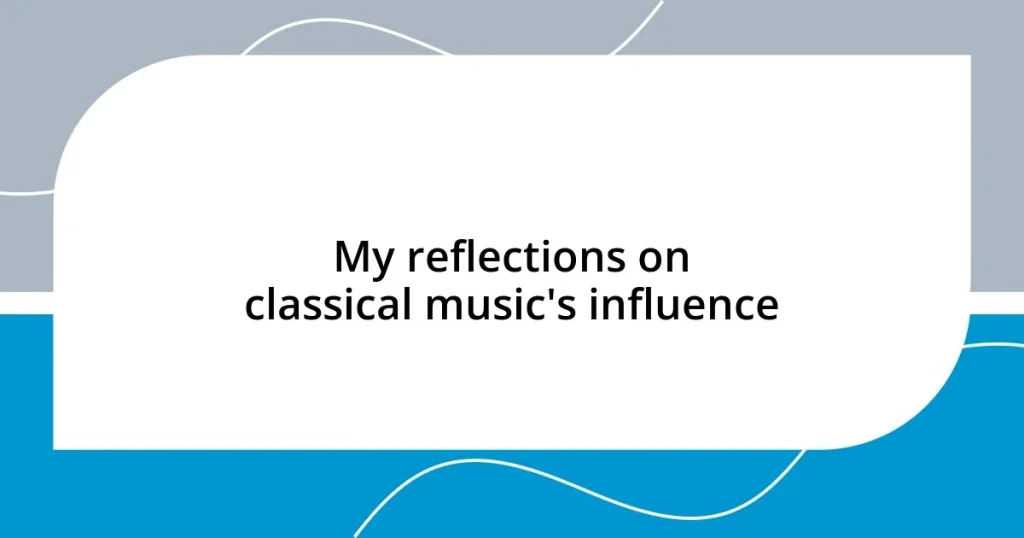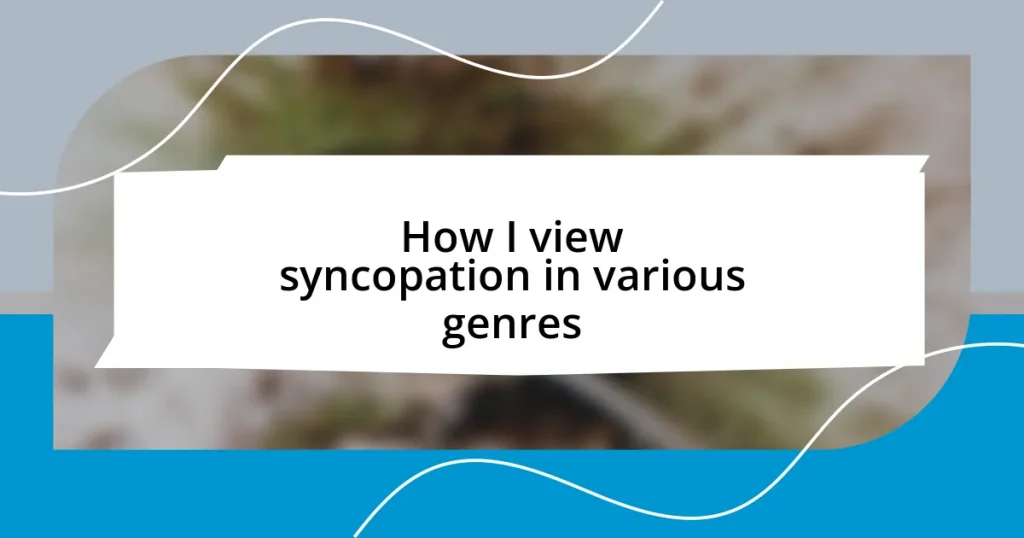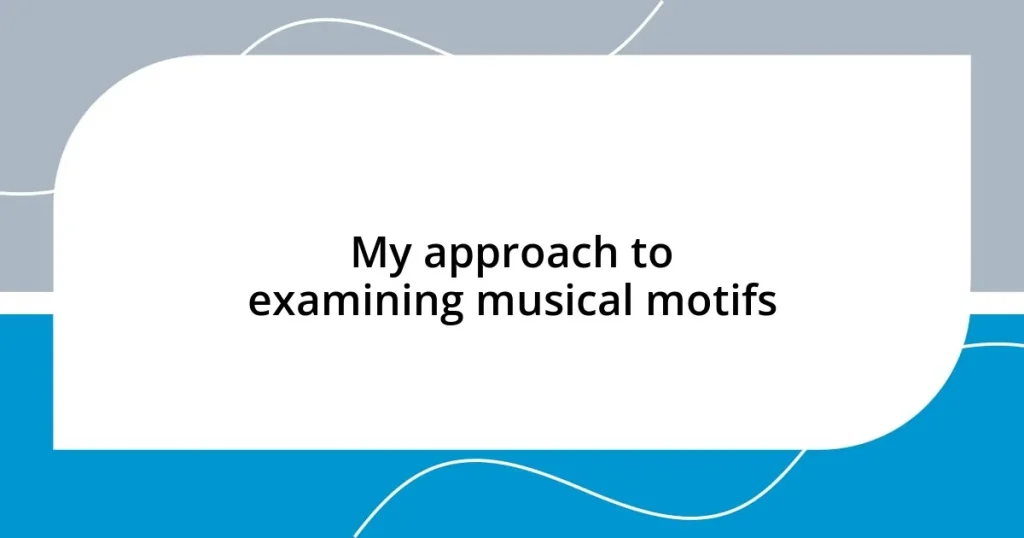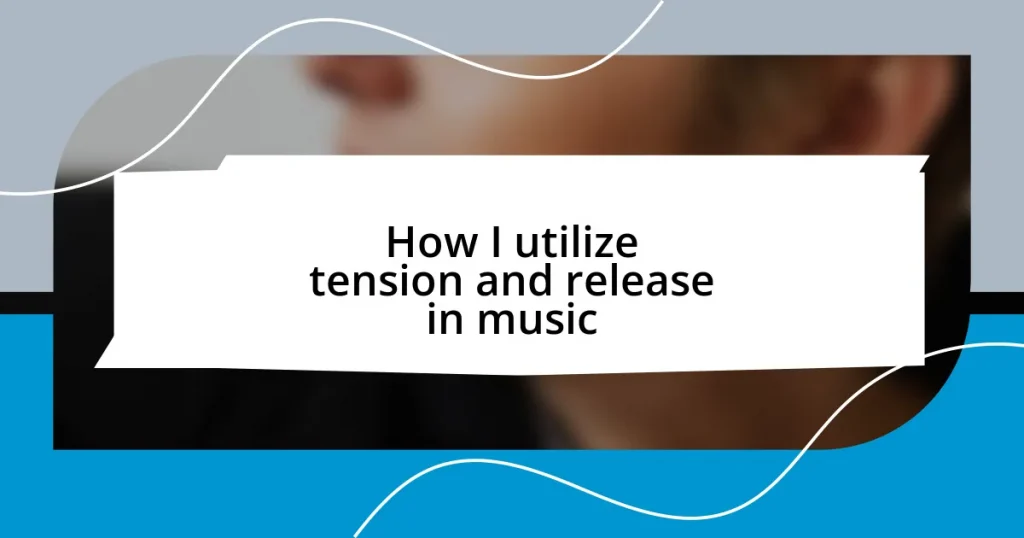Key takeaways:
- Classical music significantly enhances emotional wellbeing, aids in relaxation, and fosters creativity and concentration.
- Research supports the “Mozart Effect,” indicating that classical music can improve cognitive functions like memory retention and problem-solving skills.
- Integrating classical music in educational settings boosts student focus, reduces anxiety, and enhances learning experiences.
- The future of classical music appreciation relies on digital accessibility, educational initiatives, and innovative fusions with contemporary genres to engage younger audiences.
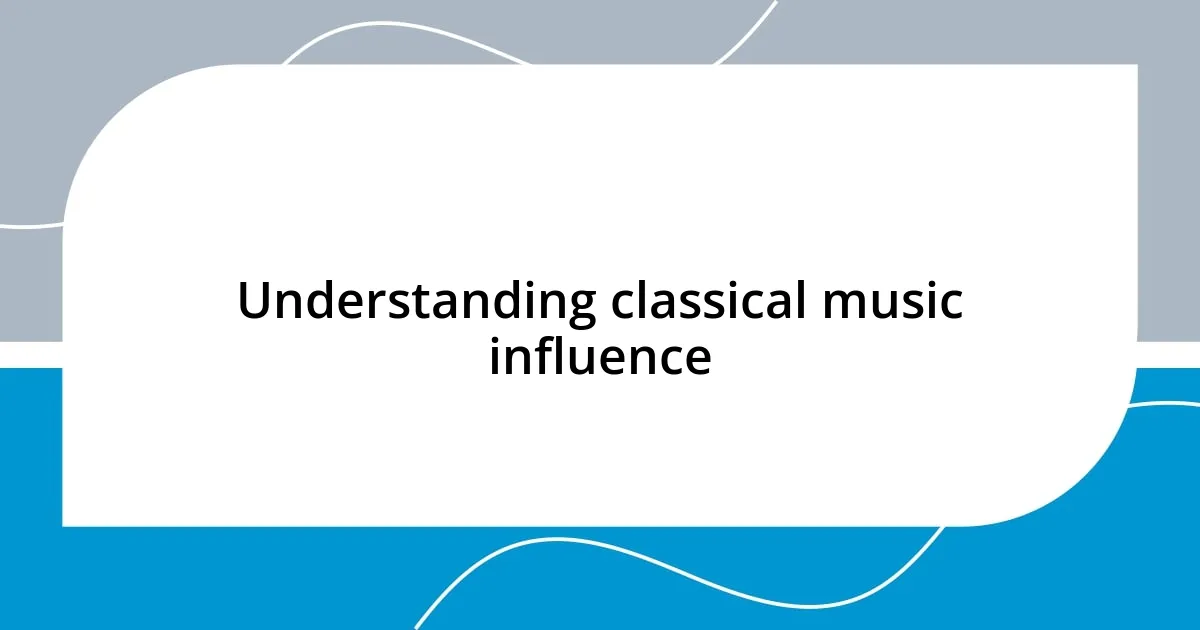
Understanding classical music influence
When I listen to classical music, I often feel transported to another world, where emotions are laid bare without the need for words. It’s fascinating to think about how composers like Beethoven or Mozart have shaped not just music, but entire genres and even cultural movements. Have you ever noticed how a simple melody can evoke such profound feelings? That speaks to the depth of classical music’s influence.
In my experience, classical music has a remarkable ability to enhance concentration and creativity. There have been countless times when I’ve sat down to write, filling my space with the strains of a Schubert symphony. It’s incredible how the intricate harmonies spark ideas that feel almost too spontaneous to grasp. It’s like the music is lifting the fog from my thoughts, guiding my fingers over the keyboard.
Consider how classical music has been woven into popular culture—a testament to its lasting impact. Whether it’s appeared in film scores or commercials, the echoes of composers resonate with all of us, sometimes without our even realizing it. Isn’t it intriguing how a few bars of a Tchaikovsky piece can instantly conjure memories of a beloved movie? This seamless blend reveals just how deeply classical music has seeped into our collective consciousness.
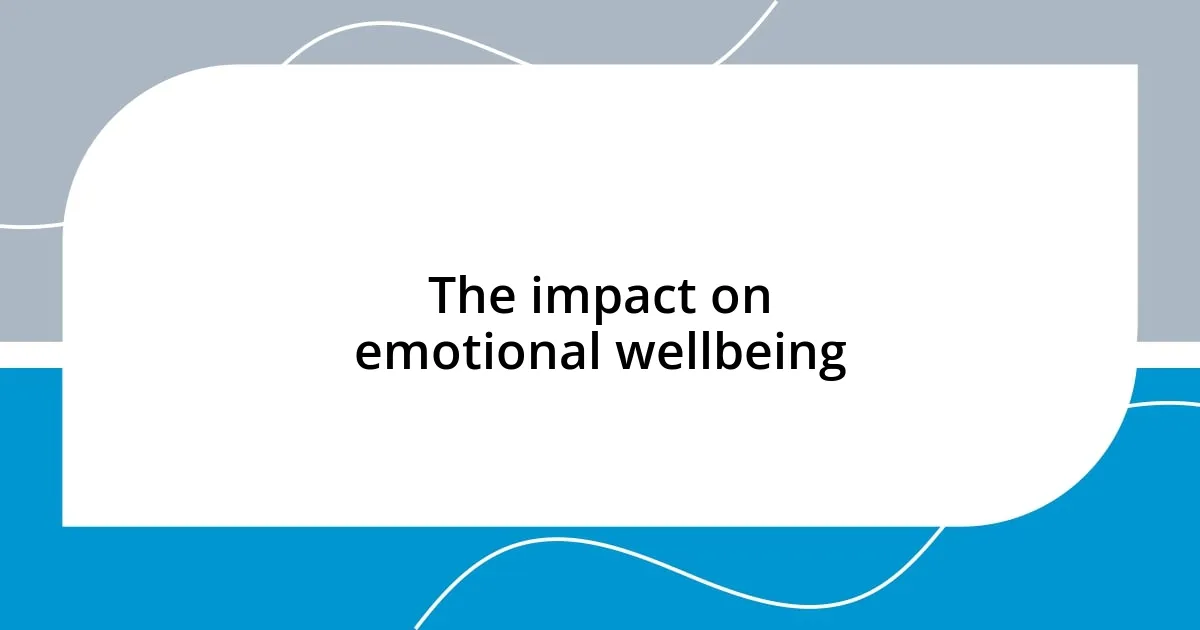
The impact on emotional wellbeing
Listening to classical music can profoundly uplift my emotional state. I recall a time when I was feeling particularly overwhelmed. I found solace in playing Debussy’s “Clair de Lune.” The soft, flowing melodies created a sense of peace that gradually replaced my anxiety. It was as if the music wrapped around me, reminding me that emotions could be both intense and beautiful.
- Classical music can reduce stress and induce relaxation.
- It helps to enhance mood, often lifting spirits during difficult times.
- Personal memories liée to specific pieces can create a comforting emotional sanctuary.
- Engaging with classical music encourages emotional expression, offering listeners a cathartic experience.
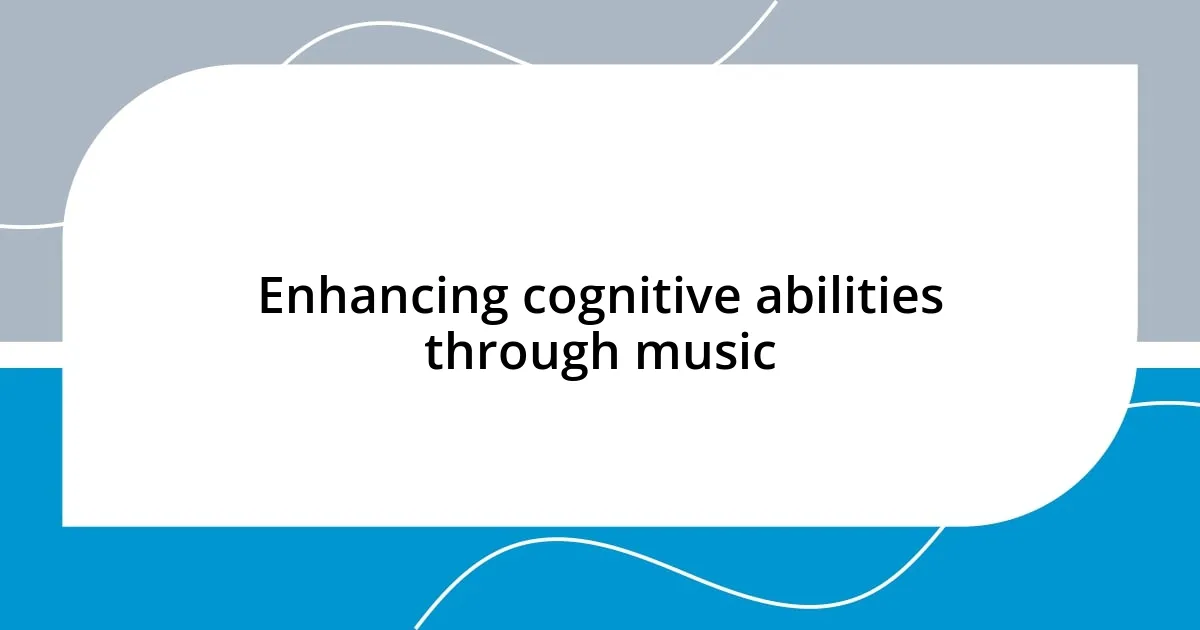
Enhancing cognitive abilities through music
Listening to classical music can be a surprising boost for cognitive functions, often leading to enhanced memory retention and focus. For instance, I remember studying for an important exam while playing Vivaldi’s “Four Seasons.” I found that the structured flow of the music helped me organize my thoughts and internalize complex concepts much more effectively. Have you ever tried utilizing music to aid your studying process? It could be a game-changer.
There’s compelling research behind the so-called “Mozart Effect,” which suggests that listening to classical compositions may temporarily enhance spatial-temporal reasoning skills. I’ve put this to the test, particularly when tackling challenging tasks like solving math problems. I noticed that the clarity in thought and problem-solving I experienced while listening to Beethoven was almost exhilarating. It’s like the rhythm of the music aligns perfectly with the mechanics of my brain, making it far easier to navigate complex ideas.
Interestingly, engaging with classical music not only sharpens cognitive abilities but also improves motivation and productivity. I often find that this type of music creates a pleasant background ambiance, allowing me to immerse myself in my work without distraction. Have you considered how specific pieces might inspire you during your creative processes? It’s fascinating to witness how the right musical backdrop can energize the mind and transform a mundane task into a deeply engaging experience.
| Aspect | Impact of Classical Music |
|---|---|
| Cognitive Function | Enhances memory retention and focus |
| Problem Solving | Can improve spatial-temporal reasoning skills |
| Motivation | Boosts productivity and inspiration during tasks |
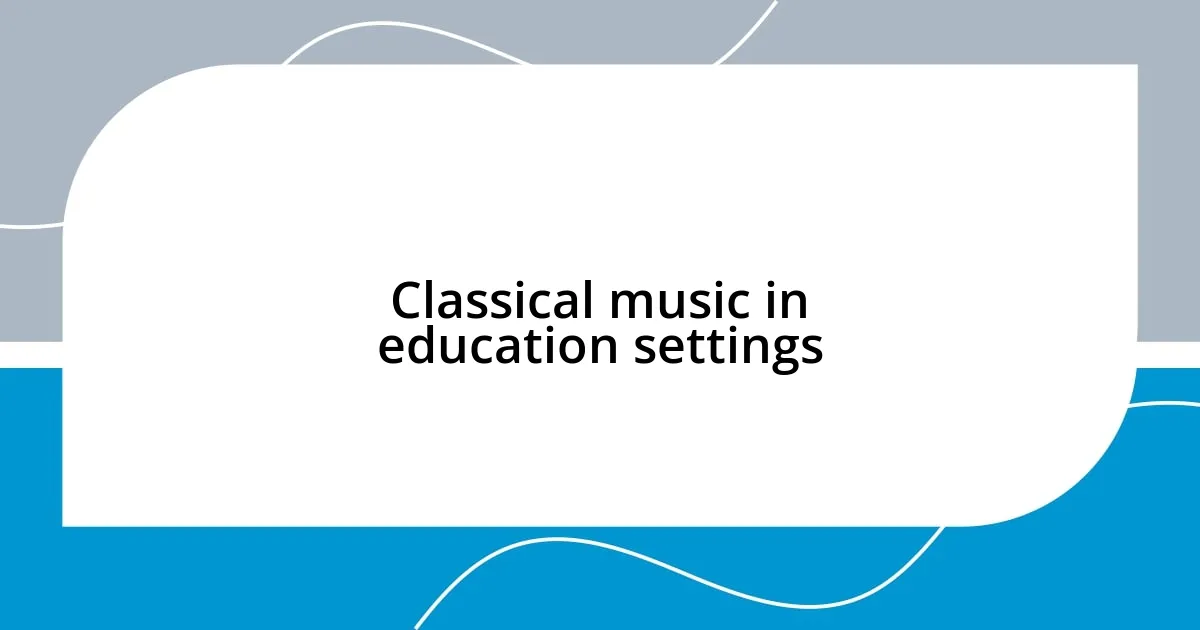
Classical music in education settings
In education settings, classical music can serve as an incredible tool for enhancing learning environments. I vividly remember when my professor played Bach during a lecture on historical contexts of the Baroque period. It added depth to our discussion, immersing us in the culture of the time. I often wonder how much differently we might perceive history if music were included more regularly in our curriculum.
Moreover, integrating classical music into classrooms can significantly improve students’ concentration and reduce anxiety during tests. I’ve observed this firsthand when a friend of mine, who struggled with math, played Chopin before exams. The calming piano notes seemed to bring him clarity and poise, transforming his approach to problem-solving. Have you ever considered how a simple melody might shift a student’s confidence level when faced with academic challenges?
Finally, the communal experience of performing classical music can foster teamwork and collaboration among students. My own journey in a youth orchestra taught me the importance of listening to others and finding harmony within a group. There’s something profoundly empowering about creating something beautiful together. Isn’t it interesting how the heartbeat of classical music can build not just individual skills, but a sense of belonging among peers?
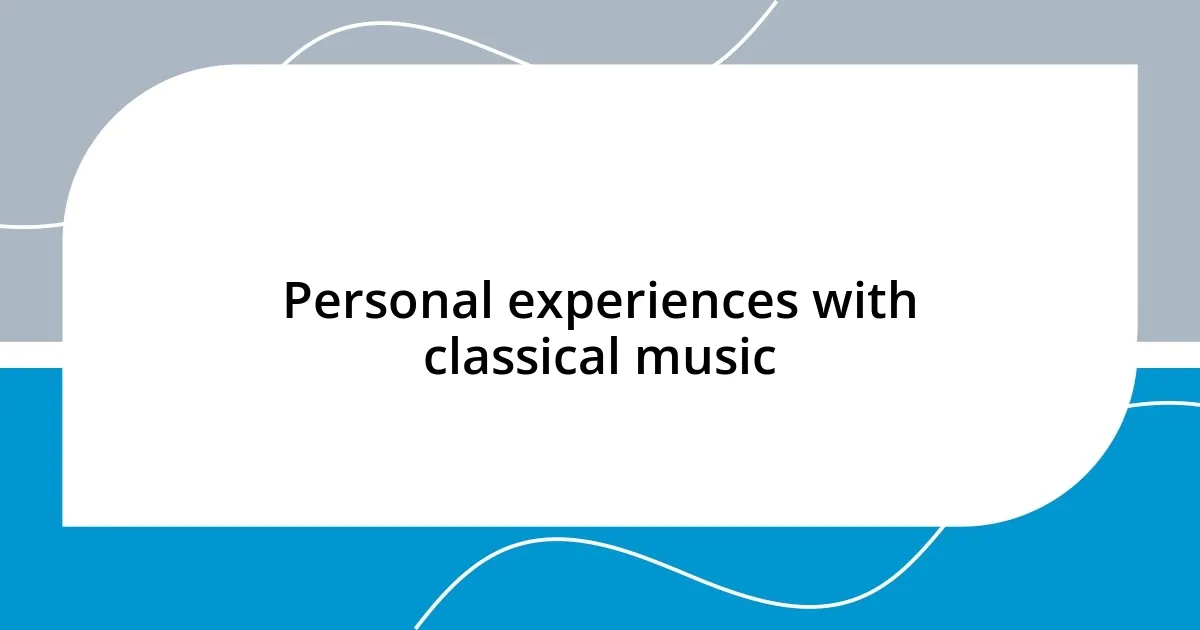
Personal experiences with classical music
Classical music has always held a special place in my life, evoking a range of emotions and memories. I remember my grandmother playing Tchaikovsky’s “Nutcracker Suite” during the holidays, creating a magical atmosphere that filled our home with nostalgia and warmth. Whenever I hear those orchestral melodies now, a wave of comfort washes over me, reminding me of family gatherings and the joy they brought.
One particular experience stands out; during a challenging time in my life, I attended a live orchestra performance of Mahler’s symphonies. The sheer power of the music resonated with my struggles, offering me a cathartic release. I could feel each note piercing through my heart, guiding me toward a sense of hope. Have you ever experienced a moment when music seemed to articulate feelings you couldn’t quite express? That night, Mahler didn’t just provide solace; he became a voice for my soul.
Even in quieter moments, I’ve noticed the impact classical music has on my creativity. While painting, I often queue up Debussy’s “Clair de Lune,” letting its gentle piano strokes flow through me. The delicate harmonies spark inspiration, allowing me to lose myself in the colors and textures on the canvas. Isn’t it incredible how some compositions can stir the imagination and alter the creative process? For me, that symbiotic relationship between art and music is something I treasure deeply.
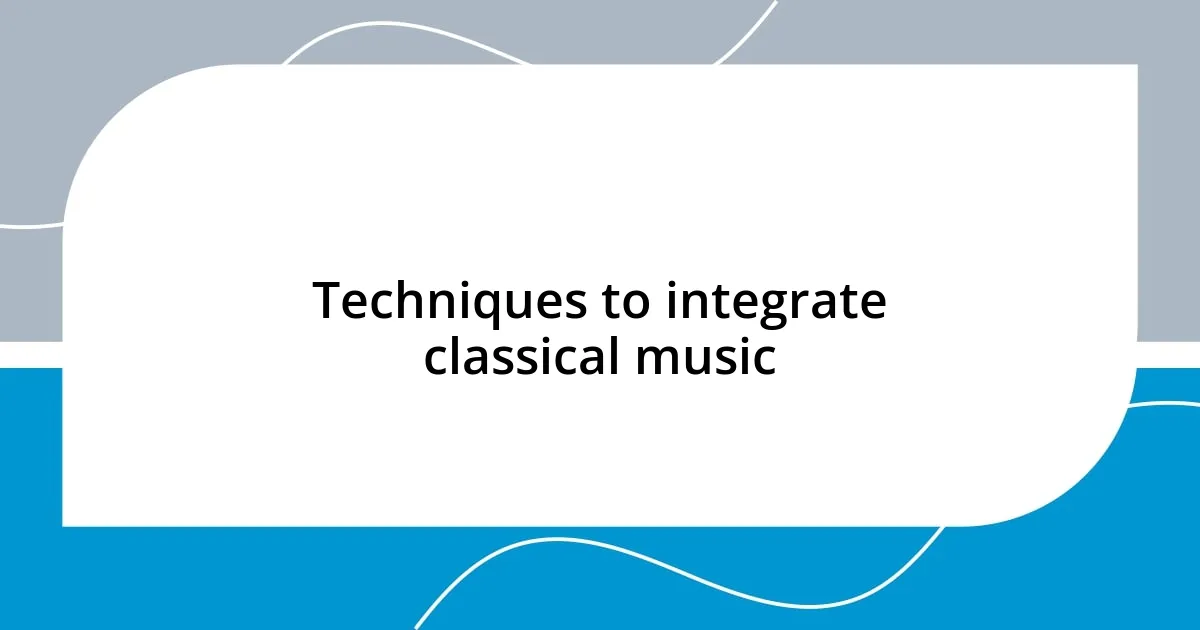
Techniques to integrate classical music
Integrating classical music into different areas of life can be a powerful technique that often goes overlooked. For instance, I’ve found that playing Vivaldi’s “Four Seasons” while exercising makes a noticeable difference in my motivation. The lively tempo lifts my spirits, making each workout feel less like a chore and more like a celebration of movement. Have you ever tried pairing music with physical activity? It can truly transform the experience.
Incorporating classical music into daily routines can also enhance focus and productivity. I often play instrumental pieces by composers like Mahler or Brahms while working on complex tasks. The absence of lyrics allows my mind to dive deeper into my thoughts, while the rich orchestrations provide a soothing backdrop that keeps me engaged. Isn’t it fascinating how the right music can virtually create a bubble of concentration?
Another impactful technique is using classical music in moments of reflection or meditation. I recall an evening when I dimmed the lights and listened to a selection of Chopin’s Nocturnes. That stillness, combined with those haunting melodies, allowed me to reconnect with my thoughts and feelings in a profound way. Do you ever find that music acts as a guide during introspective moments? For me, that experience can lead to clarity and self-discovery, rather than mere silence.
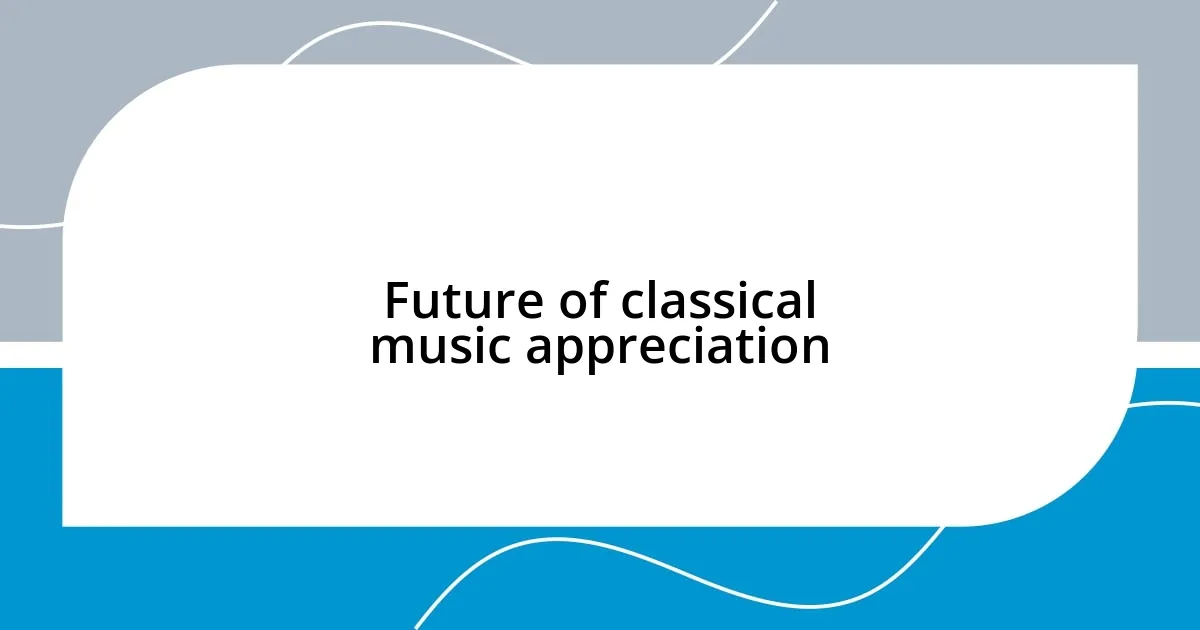
Future of classical music appreciation
The future of classical music appreciation seems promising, especially with the rise of digital platforms that make this genre more accessible. I recall the excitement I felt when I first discovered classical music playlists on streaming services. Suddenly, I had a world of symphonies, concertos, and chamber music at my fingertips. Isn’t it amazing how technology can bridge the gap between generations and introduce us to composers we might never have encountered otherwise?
Engaging younger audiences will be crucial, and I believe educational initiatives can play a significant role. I vividly remember an outreach program that brought live musicians into local schools. Watching children’s eyes widen as a cellist explained the rich history of their instrument was truly heartwarming. Have you ever witnessed the joy on a child’s face when they connect with music? Experiences like that can ignite a lifelong appreciation for classical music, transforming it from a mere academic subject into a vibrant passion.
As we continue to innovate, blending classical music with contemporary genres might be the key to maintaining its relevance. I once attended a performance where a DJ remixed Beethoven with modern beats, and I was fascinated by how the audience reacted. That fusion sparked conversations among attendees about music’s evolution and its timeless quality. Have you thought about how blending styles can bridge the gap between the classical canon and today’s musical landscape? It’s these creative intersections that might just chart the path forward for keeping classical music alive and cherished.











